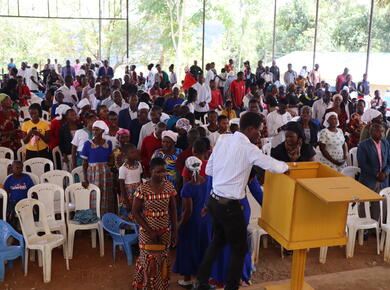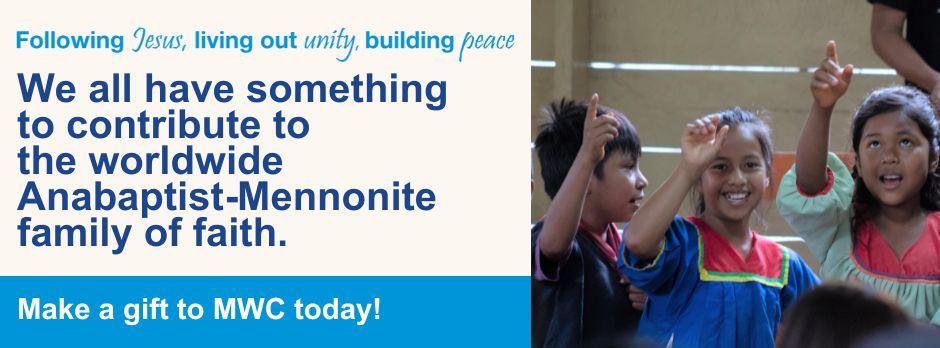Posted: October 22, 2023
“The way to address inequality is treating people differently – not the same,” says Arli Klassen, MWC regional representatives coordinator.
Mennonite World Conference is an organization made of members. However, financial resources vary widely within its global membership. Fair Share is MWC’s way to for all national member churches to contribute based on their ability and needs.
“When you become part of MWC, you become part of giving, not only receiving,” says Cynthia Peacock, MWC regional representative for Southern Asia.
“Even when you have little, out of that little, you share,” she says. “When we are in need, others are giving to us.”
In 1984, the executive secretary suggested a shift from the standard per-member figure to a negotiated amount. National economic indicators would be part of the new funding formula. The General Council approved the Fair Share Funding Formula in 2000.
Every three years, the regional representatives approach the General Council delegates to discuss their membership contribution and to sign the Mutual Expectations Covenant.
“MWC’s Fair Share acknowledges relative wealth (through assessment). Through negotiation, it acknowledges there is more diversity than hard numbers reflect. It makes space for conversation based on the principle that every member church can contribute something to the global body of Christ,” says Arli Klassen.
Negotiation
“Because I am one of them [a church leader from Southern Africa], I am not ignorant of the needs,” says Danisa Ndlovu, MWC regional representative for Southern Africa. “But all of us have something to contribute to the body of Christ. In the end, it is the body that benefits.”
Cynthia Peacock points out that churches can receive grants from the Global Church Sharing Fund. “Leadership understand that conferences are benefiting – not only financially but also in other ways.”
A basket for giving and receiving
In Southern Africa, “the impression we have been given is that we can always carry a basket to receive,” says Danisa Ndlovu. He encourages leaders to see that “everyone is in need, and everyone needs help.
“In the midst of the challenges we have, we must also appreciate that God is blessing us in some way. It is important for us to also be a blessing to the rest of the body – and ourselves as part of the body,” says Danisa Ndlovu.
The regional representative want the message to permeate even to the congregations where many languages are spoken. Cynthia Peacock translates MWC articles, worship resources, videos and Mutal Expectations into Hindi, Bengali, Odiya and Tamil to make them widely accessible.
“Once leaders are convinced about what I share, they invite me to visit them again to learn and to be connected with the global church and be strengthened,” says Cynthia Peacock.
One Lunch
The worship events (Anabaptist World Fellowship Sunday, Peace Sunday) provide an opportunity for One Lunch giving. If each baptized congregation member would give the equivalent cost of one lunch a year, the assessed Fair Share amount would be met.
“Sometimes members spend Rs.100 (Indian Rupees) or more a month for recharging mobiles; therefore, giving Rs.20 per year toward Fair Share is not impossible.”, says Cynthia Peacock.
One Lunch is a more challenging concept in rural Africa, says Danisa Ndlovu, where some people may only eat one meal a day.
Yet, “God is not calling us to give out of what we don’t have but out of the little that we have,” he says. “God calls us to be joyous in doing that (2 Corinthians 9:7).”
Challenges
“National member churches on every continent say they can’t give the full assessed amount, so we start conversations,” says Arli Klassen. “The cultural differences come out clearly” as Fair Share is negotiated around the world.
“The responsibility to contribute to the common good is well understood in Africa,” says Arli Klassen. “In most of the Global South, leaders readily enter into conversation about amounts, saying ‘we need help’.”
There is a strong commitment to paying taxes to help the whole community in Europe. There, assessed amount is taken very seriously. In North America, there is a reticence to negotiate.
“We want member church to come up with a proposal of what is fair for them. My personal goal is that relationships are strengthened. The financial commitment reflects commitment to the global Anabaptist communion,” says Arli Klassen. “Every church can contribute something. That’s part of what it means to be a member.”
“To the new generation, a reminder and a challenge is that through the efforts of many missionaries we received much. Leaders have strived to maintain the vision with which the churches were established,” says Cynthia Peacock.
“Now we have much in terms of houses, cars, good jobs and therefore, with a thankful heart, it is time to give more to the local and global church to make our churches holistically strong,” she says. “For this, we need to build healthy relationships to listen to each other and live out unity as disciples of Christ.”



Join the Conversation on Social Media
FacebookTwitterInstagramFlickrYouTube